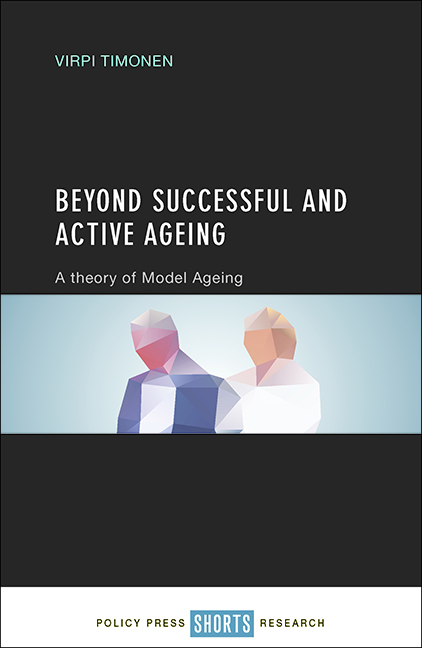Three - Critique of active ageing models
Published online by Cambridge University Press: 01 September 2022
Summary
The previous chapter outlined the argument that the successful ageing paradigm seamlessly ‘translated’ or ‘migrated’ into the anti-ageing industry (Flatt et al, 2013). In this chapter, I argue that successful ageing ideas have also made their mark on policy, feeding into the notion of active ageing. Active ageing is ‘primarily a policy concept’ (Juul Lassen and Moreira, 2014, p 33). Gerontologists have contributed to the translation of successful ageing ideation into the policy sphere, where the ideas take on a more practice-oriented form; this is a manifestation of what I call modelling ageing.
The meaning of active ageing remains somewhat vague, largely because the actors who employ the concept use it ‘as a convenient term for a wide range of policy discourses and responses concerning demographic change’ (Walker and Foster, 2013, p 28). Despite this blanket application, Foster and Walker (2015) argue that active ageing has emerged in Europe as ‘the foremost policy response to the challenges of population aging’ and that it ‘presents a more holistic, lifecourse- oriented approach than successful aging’ (p 83). Immediately following this statement, however, Foster and Walker qualify that the active ageing perspective ‘has been dominated by a narrow economic or productivist perspective that prioritizes the extension of working life’ and ‘has also been gender blind’ (p 83). Foster and Walker argue that the active ageing paradigm is split into two contrasting branches, one focused on productivity and employment, the other more ‘social’ and all-encompassing; a ‘comprehensive, non-coercive and inclusive approach’ in keeping with the latter type of active ageing is endorsed by Foster and Walker (2015, p 84). Their view of the concept is deeply bifurcated into ‘the good’ meaning of active ageing (understood as attempts to help everyone to age well, in accordance with their resources and with the help of supportive policies) and the ‘bad’ meaning of active ageing (understood as agendas for driving productivity and growth without regard to structural barriers that many older adults face). The parallels to the confusion over the meaning of the concept, and the objectivist and subjectivist understandings of successful ageing (outlined in Chapter Two) are striking.
- Type
- Chapter
- Information
- Beyond Successful and Active AgeingA Theory of Model Ageing, pp. 35 - 60Publisher: Bristol University PressPrint publication year: 2016

